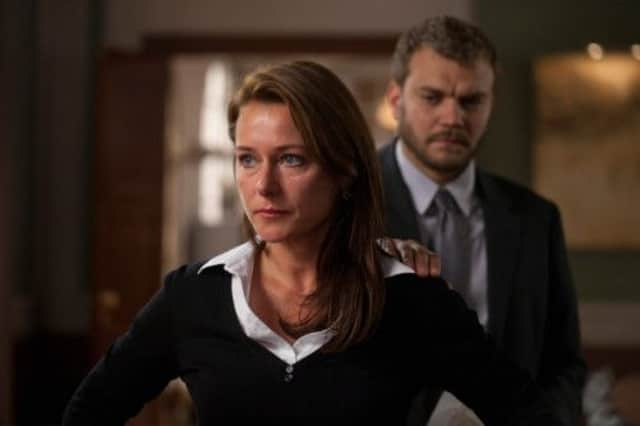Dani Garavelli: Date night won’t cure a headache


Though quite a Scandinavian pastime, I’m not sure it’s what Norway’s minister for children, equality and inclusion, Solveig Horne, had in mind when she said couples should have regular date nights to pep up their flagging marriages. But it wasn’t all bad. It did require us to be in the same room for more than 20 consecutive minutes, a rare treat. While the conversation wasn’t exactly stimulating – “Pass us the Allen key” being a poor substitute for the late-night dissections of favourite films I recall from courting – at least we weren’t talking about the children (a no-no on date nights, apparently). And we did have a drink to celebrate its successful erection.
Horne, whose right-wing Progress Party joined the coalition after last month’s election, took on the mantle of a Relate counsellor last week to tackle Norway’s divorce rate, which stands at 40 per cent, with those aged 40-44 most at risk of splitting from partners.
Advertisement
Hide AdAdvertisement
Hide AdWhile stressing the government would stop short of forcing marrieds to commune with their spouses, or funding their entertainment, Horne strongly recommended couples set aside pockets of time to be “lovers”. “Maybe I didn’t have success [in my marriage], because we didn’t have date nights,” the divorcée lamented. Horne, who took her inspiration from the US movie of the same name, said hectic lifestyles were to blame for couples drifting apart, while grandparents were often too busy enjoying retirement to baby-sit.
Anyone who has ever watched Borgen understands what she is getting at (OK, so that’s Danish, but cut me some slack here). One minute Birgitte Nyborg’s marriage is hunky-dory and she’s having marital sex on every piece of stylish Nordic furniture she possesses, the next she’s struggling to cope with being prime minister and her husband’s run off with the first attractive woman that crosses his path. If only she hadn’t taken running the country so seriously, she could have carved out some “together time” and held on to her man (though the opposition would have smelled weakness, knifed her and she’d have been out of a job).
Setting aside the folly of basing policy on a Hollywood blockbuster – particularly one in which the date night goes horribly wrong and the couple ends up being mixed up with the Mob – you can see how Horne’s announcement could be interpreted as symptomatic of Norway’s lurch to the Right. Its divorce rate has risen as women have become more independent; any strategy to reverse that trend might be viewed as an underhand attempt to encourage them to sacrifice their hard-won freedoms on the altar of domestic harmony, especially when voiced by a politician who once said rape victims were responsible for the situation they put themselves in.
Isn’t a focus on marriage, stability and family values inherently conservative? And what about those couples whose relationship is so fractured it is making themselves and everyone around them miserable? Wouldn’t it be more productive to encourage them to make a clean break and move on?
Even if you accept that helping couples revitalise their relationships is preferable to having them disintegrate under the stresses of daily living, you have to ask yourself about the practicality of the date-night concept. It sounds so appealing when glitzy power couples such as Barack and Michelle Obama talk about sneaking off to a bijou restaurant mid-week to keep the passion alive, but they have an army of helpers to relieve them of domestic responsibilities. You can’t imagine them getting half-way through their main course and then remembering they haven’t made the packed lunches or sorted out clean uniforms for the following day. Or finding they’ve come out with puke or paint or papier mâché down their outfits.
Sometimes so much organisation is required just to get out of the door for a set time, all the pleasure is sucked out of the experience. Maybe you’ve had such a ferocious argument about whose responsibility it was to book the cab, you spend the meal talking to each other through gritted teeth, or you’re just so exhausted by the time you reach the cinema you doze off during the opening credits. And what if your relationship has already deteriorated to such a degree you find it impossible to exchange a civil word one day to the next? Is all that hostility going to evaporate just because you’ve put on your party togs and come out for the night? It’s much more likely the consumption of alcohol will lead to every grievance being aired in public.
In support of marriage, Horne says the government might set up counselling services where couples can learn how to talk through problems when they arise.
Of course, if politicians really wanted to tackle the divorce rate they would be better to campaign for shorter working hours, cheaper and more accessible child-care and a better work-life balance, so there was less pressure on couples and, presumably, less need for counselling, but this would require a significant investment of both time and money. In the absence of a major cultural shift, I guess date nights will have to do. My husband and I might fit one in in early 2015, barring any unforeseen work commitments, mishaps requiring a trip to A&E or the arrival of more flat-pack furniture. Who said romance was dead? «
Twitter: @DaniGaravelli1